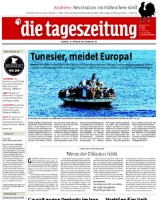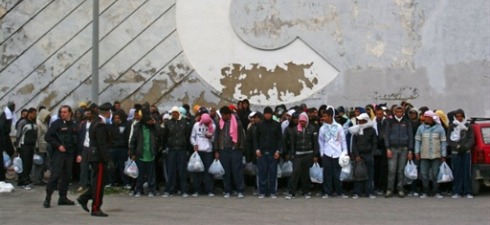The common EU foreign policy has failed its first major test. Only when it became clear that Egyptian President Hosni Mubarak had truly resigned did the EU High Representative for Foreign Affairs, Catherine Ashton, dare venture out of hiding. She had already had her preferred date in Cairo rejected – a rebuff not just for Ashton but for the entire EU.
Lady Ashton should have been carrying Europe’s vision and weight onto the world stage. But during the falls of the regimes she sank back into the scenery, so at odds were the positions of the EU states. Some, remembering 1989 in eastern Europe, supported the movements on Tahrir Square, while others wanted to wait and see what leader would emerge in the aftermath. Ashton’s predecessor in foreign policy at the European Commission, Benita Ferrero-Waldner, was at least a master of saying little in many languages quickly.
Revealing distrust in a common foreign policy

The fact that Ashton went on Monday to Tunis can’t hide the embarrassing dropout of EU diplomacy, especially as German Foreign Minister Guido Westerwelle was swifter. He was already on the ground on Saturday. For Germany – and France – a lot is at stake: economic and political relations. Germany was pumping 112 million euros a year into Egypt alone, and France 475 million into its former colonies of Algeria, Morocco and Tunisia. That was not exactly selfless economic aid, and it did help to stabilise the regimes in the region. Berlin and Paris would therefore rather not leave the field to Brussels, since they can see that their own countries’ interests are affected. The separate flights into the hotspots also reveal some distrust of a common EU foreign policy.
However, there’s a lot more in store for the EU. The stream of refugees across the Mediterranean from Tunisia shows that the desire for freedom isn’t restricted to the countries in upheaval, but is also moving towards Europe. Like Spain and Greece, Rome has been rightfully complaining for years that the other EU countries have abandoned the Italians to cope with the refugee problem all on their own. Sharing the burden in Europe is more pressing than ever, for up till now the states on Europe’s southern flank have been bearing the brunt due to their geographical location, for which they can’t be blamed. This is a case for European solidarity.
Much more than a diplomatic test

More pressing is the question of what is being offered to those states. The EU Neighbourhood Policy and the Mediterranean Union have so far been conceived of as a placebo, as a substitute for membership – knowing full well that these north African states fail to meet key criteria for acceptance. If the countries of the Maghreb and the Middle East become democracies, however, then EU states will be confronted with the demand for inclusion in the EU. These countries are quite clearly in the immediate geographical vicinity of Europe. The argument that EU membership can serve as an incentive for democratic development will come up – as it did in Turkey.
The EU is not ready for these questions. Pumping 17 million euros to Tunisia will not be enough to staunch the flow of refugees. The EU must carefully consider what future it can offer in those states, particularly to the youth. Solving the refugee problem is more than a diplomatic test. Failing it, the EU will be complicit in a humanitarian disaster.
From Italy
Urgent need for common policy
"Lampedusa close to collapse," worries La Stampa in the wake of the arrival of several thousand Tunisians who have landed on the island over the last few days. "Mattresses are piling up everywhere in the detention centre which had been closed for the past two years. Last night, 1,200 slept in a building that was designed to accommodate 850."Taking issue with Europe which has left Italy "in the lurch," the daily points out that "European decision making processes are slow, and although member states are supposed to be guided by a number of general principles, there is no proper common policy on immigration. Individual countries have retained the right do decide how many immigrants they will allow on their territory, when and if they should be granted nationality, and how illegal immigration flows should be contained."In view of this context, the newspaper argues that there is no point in asking for assistance from Europe and Frontex. Instead, "it would be more fruitful to hold direct talks with France and Germany (and also with the UK and Spain in this case) to establish a common approach for the stabilisation of the Maghreb and the control of migration flows. As was the case in previous crises of this kind, the wave of immigration from Tunisia will also affect other EU countries."
Was this article useful? If so we are delighted!
It is freely available because we believe that the right to free and independent information is essential for democracy. But this right is not guaranteed forever, and independence comes at a cost. We need your support in order to continue publishing independent, multilingual news for all Europeans.
Discover our subscription offers and their exclusive benefits and become a member of our community now!












